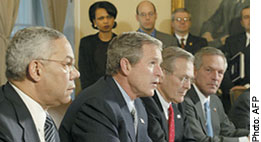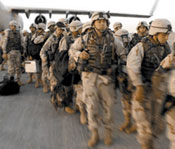- Israel demands US take action against Syria (Financial Times)
- Washington ups the ante against Syria (Al Jazeera)

WASHINGTON (FinalCall.com)–President George Bush’s war on terrorism has at last firmly rooted itself in the Iraq capital of Baghdad. The seizure of Saddam International Airport–now renamed by U.S.-led coalition forces as Baghdad International–and reports that Saddam Hussein was killed by a U.S. bomb on a residence in Baghdad has fueled world speculation that the first phase of Operation Iraqi Freedom is drawing to a close.
With the naming of Syria and Iran as potential targets, the Bush administration has sent tremors throughout the region. Already with military bases in the region, the United States now is on the verge of neutralizing the strongest threat against Israel and establishing a larger listening post in the region.
Beyond the threat to the Islamic countries, the U.S. presence is potentially troublesome for such powers as Russia and France–which have standing contractual agreements with Iraq that now are threatened–and even China.
Yet, war is still raging in Afghanistan and recent U.S. allegations against Iran and Syria have heightened speculation of an expanded Mid-East conflict, even as the Palestinian-Israeli conflict continues to explode. Many questions are afoot, but the main ones remain unanswered: When and where will these wars end, and at what price to the American public?

At the center of the new U.S. foreign policy design is a much-talked about group of “neo-conservatives” with strong alliances to Israel and a plan currently being used by President Bush where nothing is left off the table, including pre-emptive strikes against perceived threats.
Among the group are Secretary of Defense Donald Rumsfeld, his deputy Paul Wolfowitz, Richard Perle, former chairman of the influential Defense Policy Board, and Weekly Standard editor William Kristol.
Their strategy has been evolving for quite some time. In 1991, when he was third in command under then-Defense Secretary Dick Cheney (now the U.S. vice president), Mr. Wolfowitz argued in favor of pre-emptive action against countries such as Iraq and North Korea.
Back in 1997, Mr. Kristol’s Weekly Standard blared the headline “Saddam Must Go.” The next year, the Standard published a letter to then-President Bill Clinton, calling on him to remove Saddam Hussein from power. The letter was signed by 18 people, eight of whom would join the Bush administration in senior positions, including Messrs. Rumsfeld, Wolfowitz and Perle.
The group’s expansionist doctrine has even generated talk in Washington of going as far as “breaking up” Saudi Arabia into several smaller entities, according to one report. But that discussion stayed below the radar screen due to debate over the Iraq war.
The objectives of this group are so aggressive that even traditional conservatives are wary that the “neocon” view will lead to “endless war.”
“Announcing a global crusade on behalf of democracy is arrogant,” said Jessica Mathews of the Carnegie Endowment for International Peace.
The Role of Preemption
In response to the Sept. 11, 2001 attacks on the United States, the White House released in September 2002 the National Security Strategy (NSS) of the United States. It expresses to the Congress the Bush administration’s “neocon” position to ignore international jurisdictions such as the International Criminal Court, overthrow governments and topple so-called regimes in pre-emptive strikes.
The government defines pre-emptive use of military force as “the taking of military action by the United States against another nation so as to prevent or mitigate a presumed military attack or use of force by that nation against the United States.”
“We will take the actions necessary to ensure that our efforts to meet our global security commitments and protect Americans are not impaired by the potential for investigations, inquiry, or prosecution by the International Criminal Court (ICC), whose jurisdiction does not extend to Americans and which we do not accept. We will work together with other nations to avoid complications in our military operations and cooperation, through such mechanisms as multilateral and bilateral agreements that will protect U.S. nationals from the ICC. We will implement fully the American Servicemembers Protection Act, whose provisions are intended to ensure and enhance the protection of U.S. personnel and officials,” the NSS reads.
Such language does not sit well with everyone.

“There is a great danger of America policing the world,” said Frida Berigan, senior research associate for the World Policy Institute Arms Trade World Resource Center. “Different government officials have already alluded to future countries in their plans. John Bolton, the under secretary of State, said that Iran is next, Syria is next and North Korea is next. He gave a list of countries. The fact that the U.S. has gone to war basically unilaterally highlights the danger of this,” she said.
She also highlighted troop presence in Afghanistan, the Philippines, Yemen and Columbia, each of them under the rubric of fighting the war on terrorism.
“They have other motives for being there besides terrorism. There are small bully rebel groups in these countries. Do they warrant troops in the Philippines for the last year and a half? I think not,” she said.
But U.S. State Department records note that use of preemptive military force is not new. The first on record is the Spanish-American War (1898), the U.S. effort to gain Cuba’s independence of Spain. Ironically, the last recorded preemption loosely fitting the State’s definition is the Cuban Missile Crisis of 1962 under Pres. John F. Kennedy in his attempt to overthrow Cuban leader Fidel Castro.
This is not to say that the U.S. has not used military intervention the years in between, or in more recent times. There are scores of such cases throughout the 20th century, particularly in Central America and the Caribbean. Under the Monroe Doctrine, military intervention and occupation occurred in Haiti (1915-1934), Dominican Republic (1916-1924, 1965), Nicaragua (1914-1933), Grenada (1983) and Panama (1989).
Covert actions included Iran in 1953, Guatemala in 1954 and a failed attempt in Cuba in 1961, before the missile crisis.
The Joint Chiefs of Staff chairman, General Richard Myers, explained recently to the Brookings Institute the use of “The Unified Command Plan,” established last October. This little known initiative allows the President to operate beyond the authority of the Congress to conduct wars without declaring them. “It’s how the president says, ‘Here’s what I want your various commands to do,’ ” the general said.
The plan consists of the newly established U.S. Northern Command, which allows for the armed forces to assist in inner-city crises; Project Protect America, an integrated use of technologies between State, Treasury, Justice and Customs departments and intelligence communities such as the F.B.I. and C.I.A.; and local law enforcement agencies in web-based environments collecting data on people and storing it until the information becomes important to them.
The Joint Forces Command, formerly known as NATO’s Supreme Allied Commander Atlantic, based in Norfolk, Va., is responsible for transforming the U.S. military to police efforts at home, as well as in Europe. The new U.S. Strategic Command in Omaha, Neb., replaces the U.S. Space Command recently closed in Colorado Springs; and for missile defense and other forms of policing, the U.S. continues to maintain its operations around the globe with the Pacific, European, Central and Southern Command posts.
Dr. Conrad Worrill, national director of the National Black United Front (NBUF) in Chicago, said that America’s 19th century policy has been upgraded in the 21st century through the incorporation of a new domestic and international strategy.
“Domestically, internationally, they have propped themselves up as god. They see themselves as the great civilizers of the world. We have to be clear that the people engaged in this immoral and illegal war in Iraq are the same people we want reparations from,” he told The Final Call.
“So, we have to mass educate our people and the rest of the world as to what is at stake. For us, with $100 billion going to war and corporations already lining their pockets with contracts abroad to rebuild defeated countries, it means no support for Black communities at home,” he said.
“I don’t believe (America) is trying to police the world, but I do think America is attempting to secure the interests of an elitist group that has enormous power and influence,” said Khalid M. Turaani, executive director of American Muslims for Jerusalem. “This group would spare no expense to protect its corporate interests and clients,” he said.
Mr. Turaani told The Final Call from his Washington office that this approach to the world by the United States is shortsighted, and that its backlash will play itself out within the American public.
“Unfortunately, it is the American people who will pay the price for their greed in monetary terms, in hatred for America and for us as citizens from around the globe. At the end of the day, it is our sons and daughters who are put through this, while their (elitist group’s) sons and daughters go to Harvard and Yale,” he said.
Policies toward Africa
Africa is important to peace and security worldwide, according to NSS. “From a national security standpoint, the administration’s recommendations are quite consistent,” said Brett Schaefer of The Heritage Foundation in an interview with the Washington File. “They are trying to focus on reducing conflict and instability within Africa, which is a large priority. And they want to work with their European allies to achieve those objectives, especially if there is a need for peace operations,” he said.
The Bush administration announced the Millennium Challenge Account, designed to dedicate funds to African nations, as well as HIV/AIDS and clean water initiatives, while throwing her political and economic weight around the continent as well. Through the NSS, she intends to deputize Kenya, Ethiopia, Sudan and Nigeria as partners in U.S. strategy along with others, to sub-regionally perform crisis management.
Clearly, Africa’s importance to America is militarily strategic, as well as economically profitable.
“For the U.S., it’s about African oil and the need to secure a new supply” in case she is cut off from access in the Middle East, said Melvin Foote, executive director of Washington, D.C.-based Constituency for Africa.
Mr. Foote said he does not believe the administration wants to police the world.
“From what I can see and from what I am told from my sources, it is more of a matter of engagement. Terrorism is a new phenomenon to America. The rampant language of Muslim fundamentalists, 9/11 and the bombing of the embassies in Kenya and Tanzania got America’s attention and her prestige has been challenged,” he said.
“But how do you balance your approach to Africa is the question. These countries–Kenya, Nigeria, Sudan, Ethiopia–have strong Muslim populations. How do you engage them without insulting them” as war rages in Islamic countries? he pondered.
Mr. Foote said the Bush administration deserves high marks for its initiatives in Africa. He applauds the presence of Secretary of State Colin Powell, and notes that National Security Advisor Condoleezza Rice has a strong department on African affairs advising her.
“Now understand, no administration yet has taken on Africa as it should, but the goal here, from what I can see, is to engage Africa humanitarianly and economically in a way that Africa wins. Look at what oil has done in places like Angola and Nigeria. The experience over the last 30 years with Shell and others has been one of corruption, where the country saw no benefit, no roads or streets” were built, he said.
The key to a winning situation in Africa is for more Blacks to become constituents there with African leaders. “Become more knowledgeable about Africa’s needs. Become well-read and advocate for an enhanced, expanded U.S. policy for Africa.”












